Here's Why Stephen Hawking Says There Is No God
Updated on July 20, 2017
A Grand Design?
Stephen Hawking thinks that there is a "grand design" to the universe, but it has nothing to do with God. Science is coming close to "The Theory of Everything, " and when it does, we will know the grand design.
Stephen Hawking Says "There Is No God"
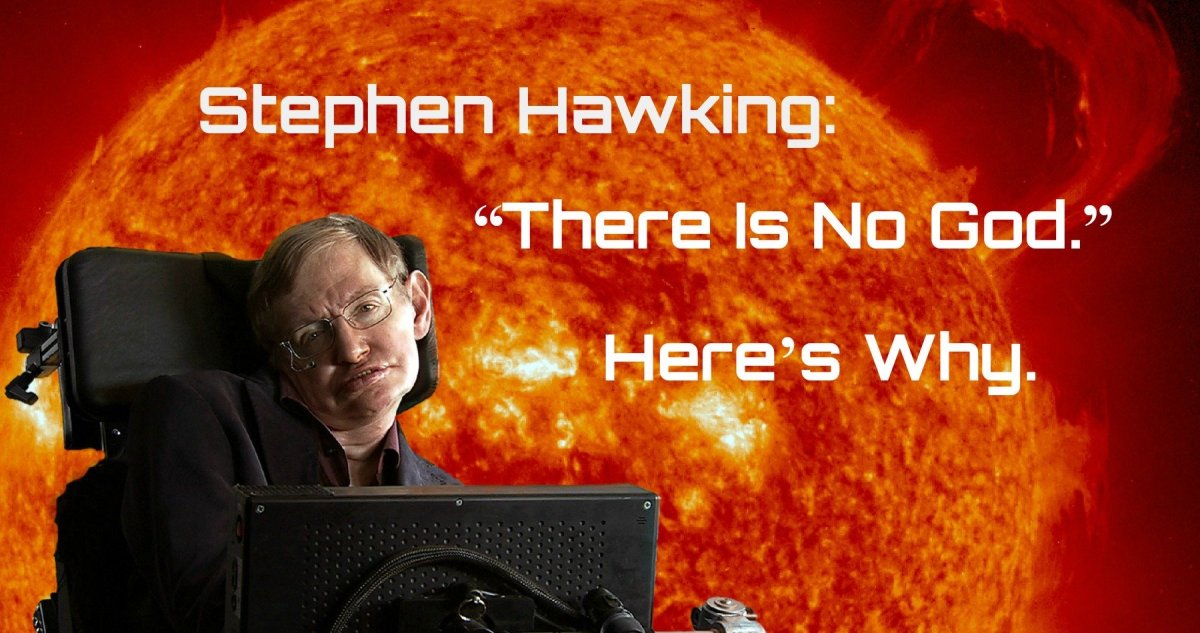
Stephen Hawking is generally considered one of the smartest people on Earth. He is a world famous theoretical physicist and cosmologist who has received many honors for his work in the field of cosmology, quantum physics, black holes, and the nature of space-time.
So when Stephen Hawking said that God didn't exist and added "I am an atheist” the world took notice.
Hawking made this statement in 2014 during an interview with Pablo Jauregui, a journalist from El Mundo, a Spanish language newspaper.
When Did Hawking Become an Atheist?
Hawking has probably been an atheist from an early age. His family was nominally Christian, but in reality, they were atheists.
As a school boy at St. Albans school, he argued with his classmates about Christianity. During his college years, he was a well-known atheist.
His first wife, Jane, whom he married in 1965 and divorced in 1995, was a devout Christian. It is clear they were never on the same page about religious matters.
Hawking’s statement denying the existence of God should not have come as a surprise to anyone. Throughout the years, Hawking has made many statements in opposition to religious beliefs.
“We are just an advanced breed of monkeys on a minor planet of a very average star. But we can understand the Universe. That makes us something very special.”“There is a fundamental difference between religion, which is based on authority, and science, which is based on observation and reason. Science will win because it works.”“We are each free to believe what we want, and it’s my view that the simplest explanation is; there is no god. No one created our universe, and no one directs our fate.”
(The above quotes come from Goodreads: Stephen Hawking Author Quotes.)
There Is No God
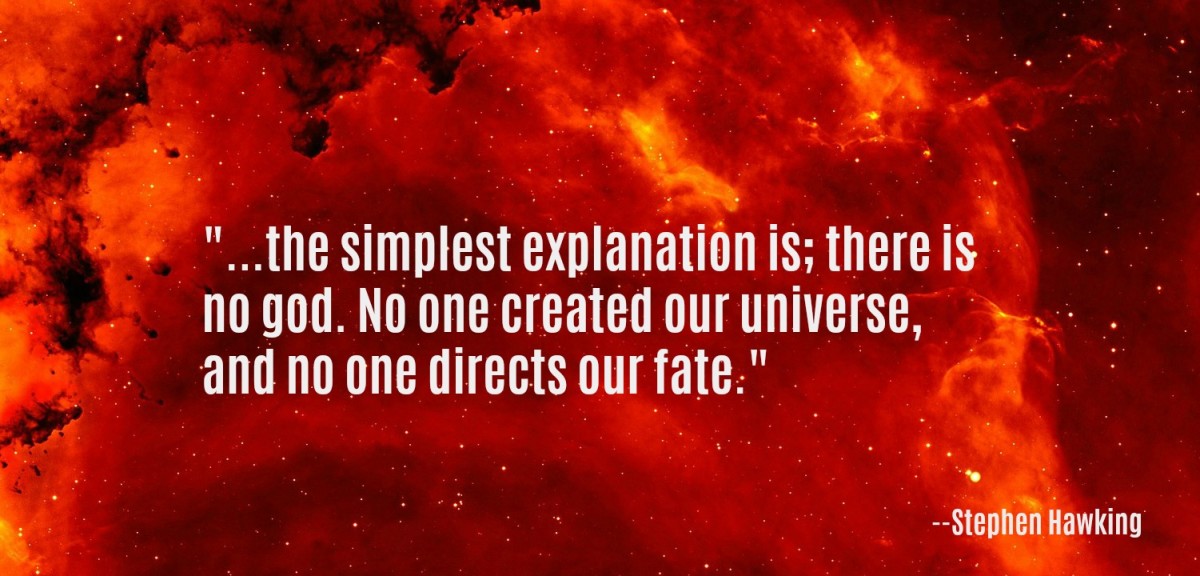
Did Hawking Ever Say Anything Suggesting Belief in God?
Hawking has made some ambiguous statements about God. For example in his 1988 book, A Brief History of Time, he discusses what it would mean if we were to ever discover why we and the universe exist. He wrote, “It would be the ultimate triumph of human reason--for then, we would know the mind of God.”
This statement has been misinterpreted by some to mean the Hawking believed in God. In the El Mundointerview, Hawking made clear that this quote was only a metaphor.
“What I meant when I said we would know ‘the mind of God’ was that we would know everything God would know if there were a God, which there isn't. I'm an atheist."T
The Mind of God"
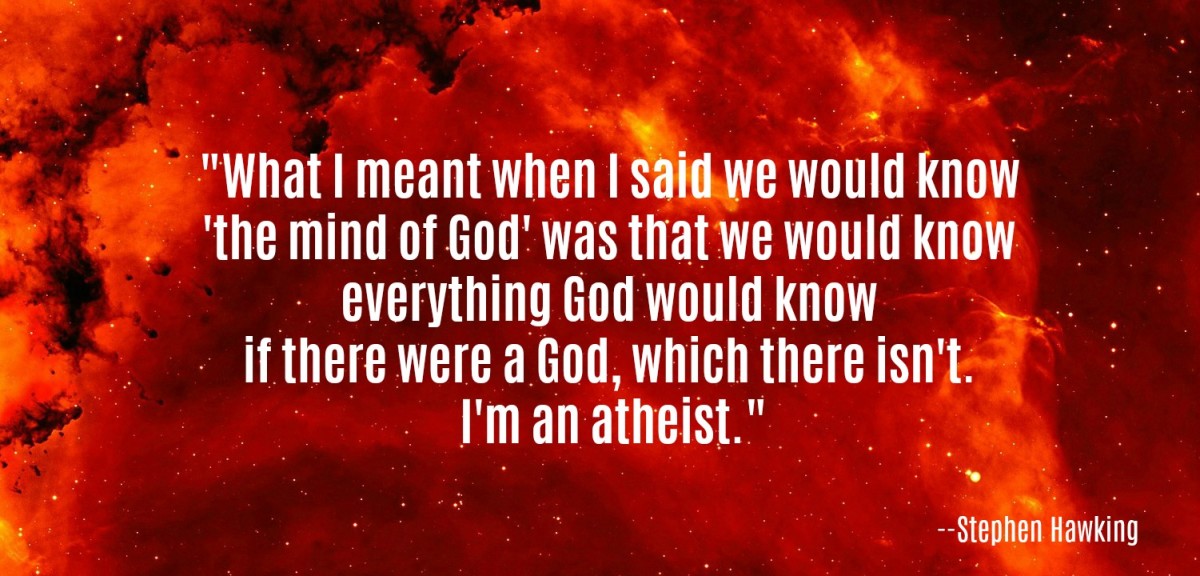
Do Scientists Tend to be Atheists?
Stephen Hawking has lots of company among his peers with respect to atheism. According to surveys, as many as 93% of top-tier scientists do not believe in God. (In comparison about 83% of Americans believe in God.)
- Nature magazine conducted a survey in 1998 among members of The National Academy of Sciences, a prestigious group of top scientists. They found that only 7% of these scientists believed in God. Further they showed the group of believers was shrinking when they compared their study to prior similar studies (28% in 1914 and 15% in 1933) so perhaps the proportion of believers is even lower today.(Nature 394,313:23 July 1998)
- A similar study was conducted among British scientists-- Fellows of the Royal Society of London. Among the British population as a whole 42% believe in a personal God, but among British Scientists, only 5% do. (Evolution and Outreach, December 2013 6:33)
Did ALS Influence Hawking’s Religious Beliefs?
Hawking was diagnosed with amyotrophic lateral sclerosis (ALS) at the age of 21. ALS is a progressive neurodegenerative disease that affects nerve cells in the brain and the spinal cord. This causes the brain to be unable to initiate and control muscle movement It eventually leads to total paralysis.
Hawking was given only two years to live. He has defied that prediction: As of this writing, he is still alive in his mid-seventies. However, he is very nearly totally paralysed. He requires an aide to push his wheel chair. He uses a voice synthesizer to speak which he controls with a cheek muscle.
Some have said that Hawking’s survival is a miracle. Hawking does not believe that. He has said, “Religion believes in miracles, but they are not compatible with science.”
His illness has not turned him against God. He was an atheist before he was diagnosed. Just as he does not need God to explain the existence of the universe, he does not need God to explain his survival. His case has always been an oddity—this disease almost always strikes people over the age of 50. Hawking was only 21 when he was diagnosed. It usually kills its victims within two to five years. Hawking has survived over 50 years. Hawking attributes his longevity to a fierce will to live and a stubborn desire not to let his illness keep him from having a full life.
Hawking has said, “However bad life may seem, there is always something you can do, and succeed at. While there's life, there is hope.”
Hawking lived his life as normally as possible. He had three children with his first wife Jane. (They were divorced in 1995 and they both remarried, but Stephen is now divorced from his second wife. He and Jane remain good friends.)
He writes, teaches, and lectures. Hawking has received numerous awards and honors for his work. He is the author of several books intended for a general audience, including an autobiography.
Stephen Hawking’s scientific achievements may even have been fostered by his illness. Being unable to live a normal physical life meant he could devote himself to the inner life of the mind. The pressure of believing that he did not have long to live spurred him to work harder in order to accomplish as much as possible in the time he might have.A Miracle or Science?
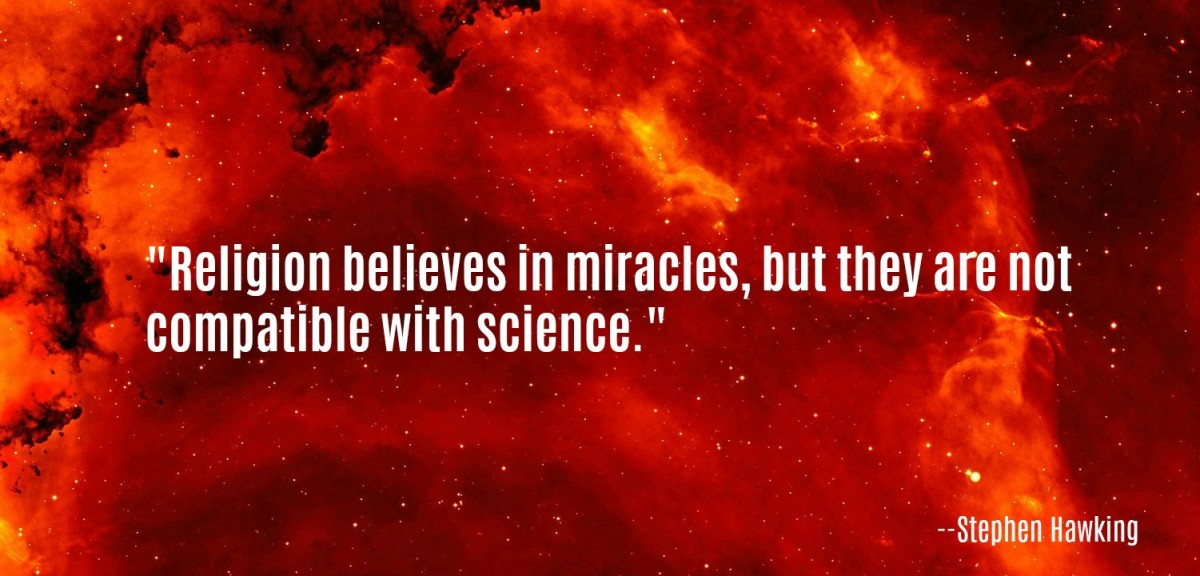
How Does Hawking Explain the Universe?
In his newest book, The Grand Design, (written with co-author, physicist Leonard Mlodinow), Stephen Hawking takes us from the earliest beliefs about the creation of the universe to the cutting edge of modern cosmology which includes quantum physics, string theory, multi-verses, and M-theory. Together these theories are bringing us close to what scientists call “The Theory of Everything”—one theory that unifies everything.
This book doesn’t play coy about belief in God. Right on page 8, Hawking writes “M-Theory predicts that a great many universes were created out of nothing. Their creation does not require the intervention of some supernatural being or god. Rather these multiple universes arise naturally from physical law.”
Something from nothing? It doesn’t make sense. We have this reaction because at the level that humans experience the universe we see cause-and-effect. But cause-and-effect does not exist on the quantum level in the same way that we experience it.
At the end of the book, Hawking sums it up on page 180: “Spontaneous creation is the reason there is something rather than nothing, why the universe exists, why we exist. It is not necessary to invoke God to light the blue touch paper and set the universe going.”
In the El Mundo interview, Hawking said, “When people ask me if a god created the universe, I tell them that the question itself makes no sense. Time didn’t exist before the Big Bang, so there is no time for God to make the universe in. It’s like asking directions to the edge of the earth; The Earth is a sphere; it doesn’t have an edge; so looking for it is a futile exercise.”
God Is Not Required
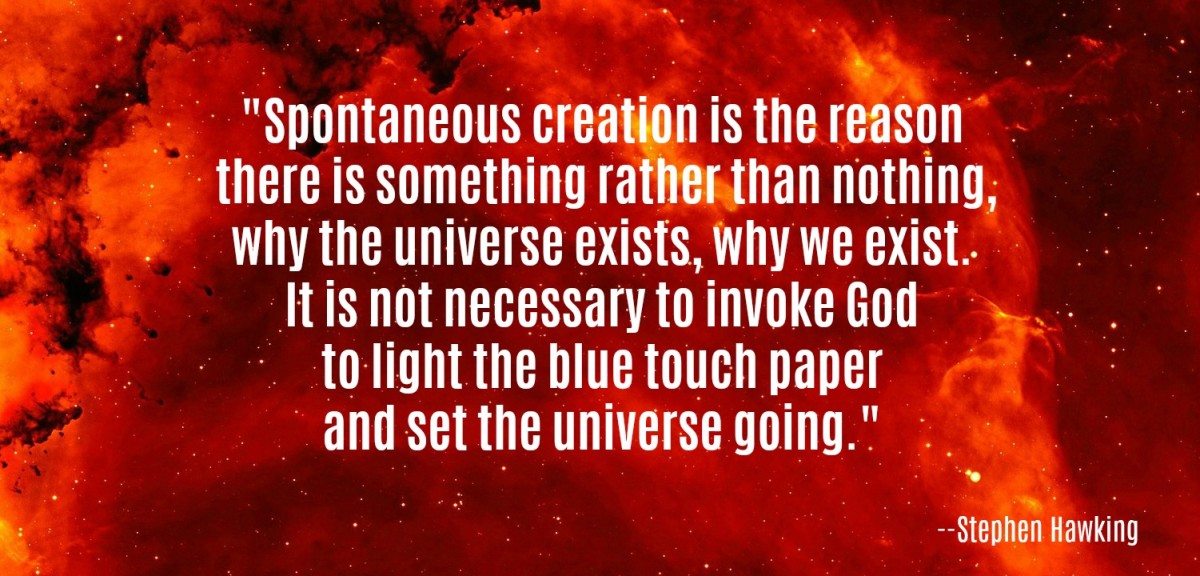
As might be expected, there was a huge outcry from religious leaders who offered vigorous rebuttals to Hawking’s statement that God did not necessarily create the universe. Their arguments were weak, petty, and often showed little to no understanding of science. They even sometimes misquoted Hawking in order to set up straw men to knock down. The rebuttals boiled down to “God exists because I say so.”
- The Arch Bishop of Canterbury, Dr. Rowan Williams, said “Belief in God…is the belief that there is an intelligent, living agent on whose activity everything ultimately depends for its existence. Physics on its own will not settle the question of why there is something rather than nothing.” (DailyMail.com 9/23/2010)
- The Chief Rabbi of the United Kingdom, Lord Jonathan Sacks, said: “Science is about explanation. Religion is about interpretation... The Bible simply isn't interested in how the universe came into being." (DailyMail.com 9/23/2010)
Some of the others said that Hawking did not disprove the existence of God. Of course, he didn’t. No one can prove or disprove the existence of an immaterial invisible being. What Hawking did do is show how the universe could come into existence without a Prime Mover to set things into motion.
Some said that you cannot get something from nothing and everything has to have a cause and God is that cause. I don’t think these critics actual read Hawking’s book because he does explain these points.
Some said that God is the laws of the universe as understood by physicists. Here’s one example of that from a blog called Christian Post: “ [Hawking’s] redefinition of ‘nothing’ in no way removes God (and actually introduces us to something like God), but instead only reacquaints us with the standard debate between two eternal ‘somethings’-–the uni/multiverse and God.”
Some point out that string theory and M-theory are not accepted by all scientists. True, but that does not mean that Hawking is wrong. Many scientists doaccept these cutting edge theories, and the fact that some do not does not disprove them.
Finally, some try to discredit Hawking, attacking him and not his work. For instance, Hawking has said life might exist on other planets and that these "aliens" might be hostile to Earthlings. They retort that there is no proof for this so everything that Hawking says must be wrong. They try to conflate mere musings (that many other scientists have also speculated about) and his scientific work.
Should Hawking Stick to Science and Leave God to Theologians?
Some critics have stated that Hawking should stick to science and leave God to theologians.
But Hawking is sticking to science. His views about God are informed by his study of science. Hawking is not discussing theology—issues like is God one or three, does God care about the eating of pork, how many angels can dance on the head of a pin—these are theological issues and Hawking has nothing to say about them.
Hawking’s opinion about God is a scientific opinion. Since the laws of physics can explain the creation of the universe, there is no need to have a Supreme Being to create it. We do not need a God who is outside space-time and who Himself was created from nothing, to create the universe. God is superfluous.
The Grand Design

The book is written for a general audience. (Even if you don’t understand all of it, you, like me, will get the gist of it.) It is liberally sprinkled with illustrations and even some corny jokes.(For instance, a discussion of cosmic microwave background radiation notes that it could only heat your food to about 3 degrees above absolute zero, so it might not be very useful for making popcorn,) You don't need to have a PhD in physics to enjoy this book. But, I'm sure the physics majors will get a lot out of this book also.
Psalm 14:1 New International Version
Psalm 14
For the director of music. Of David.
1 The fool[a] says in his heart,
“There is no God.”
They are corrupt, their deeds are vile;
there is no one who does good.
“There is no God.”
They are corrupt, their deeds are vile;
there is no one who does good.
Footnotes:
- Psalm 14:1 The Hebrew words rendered fool in Psalms denote one who is morally deficient.

No comments:
Post a Comment